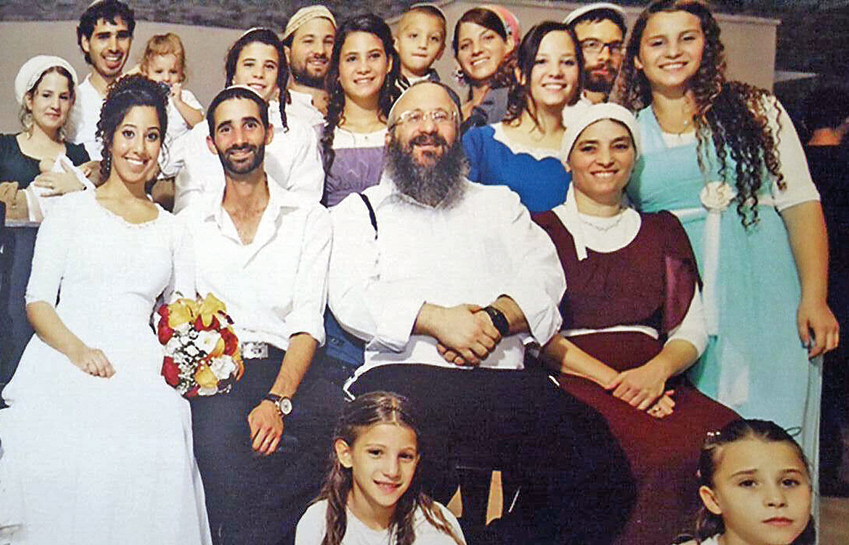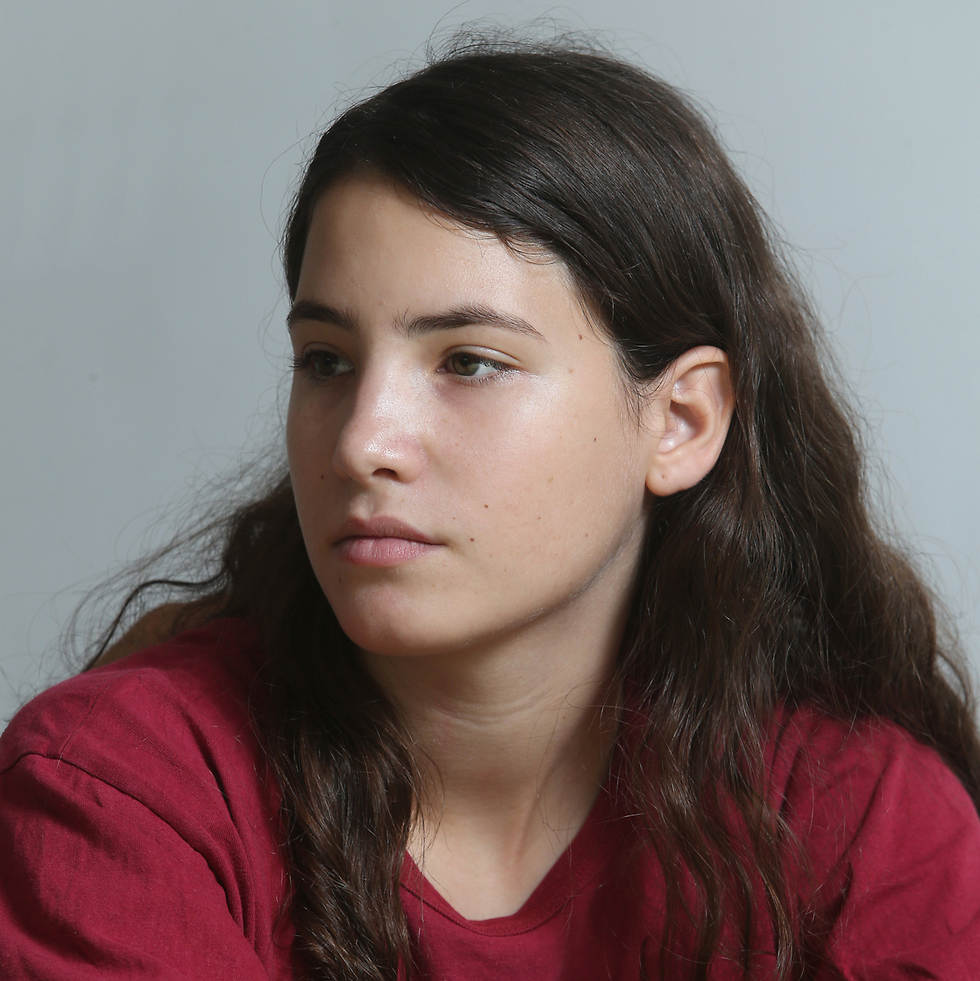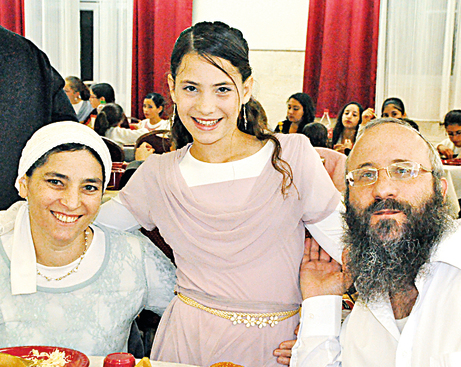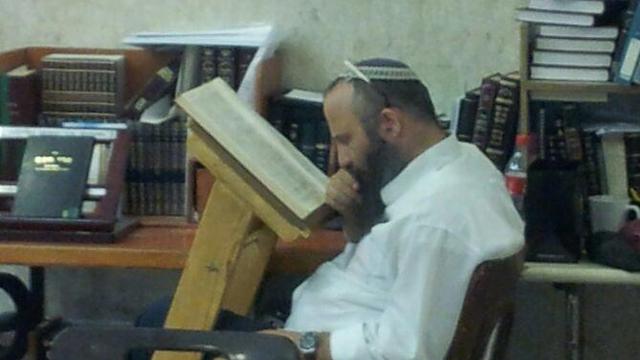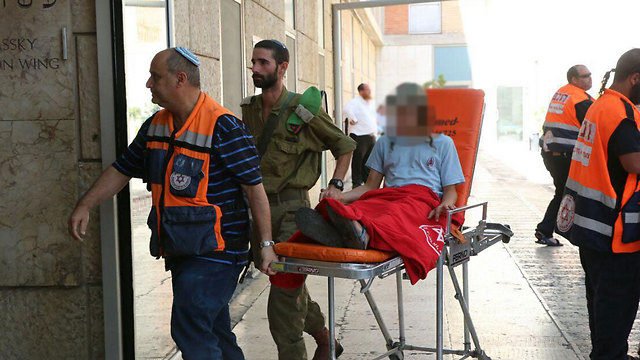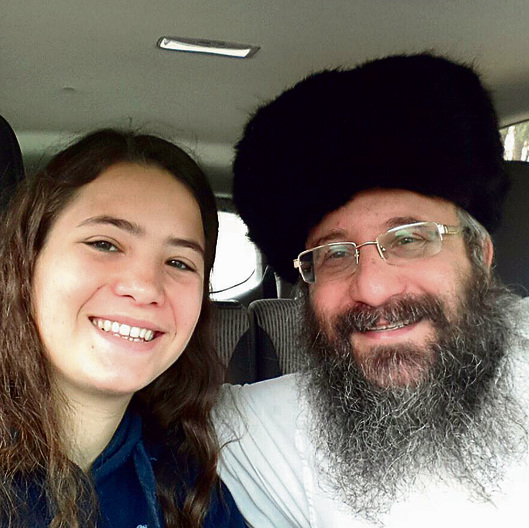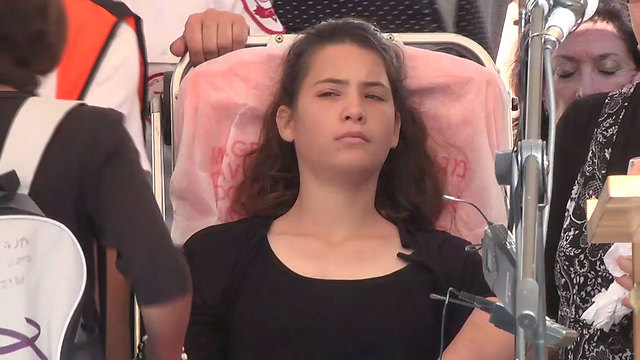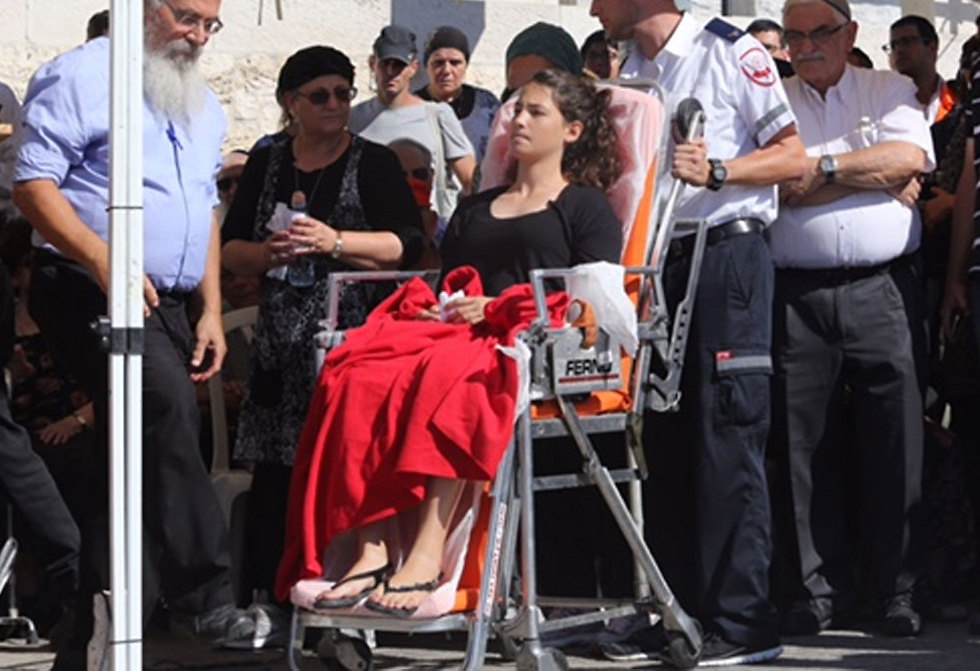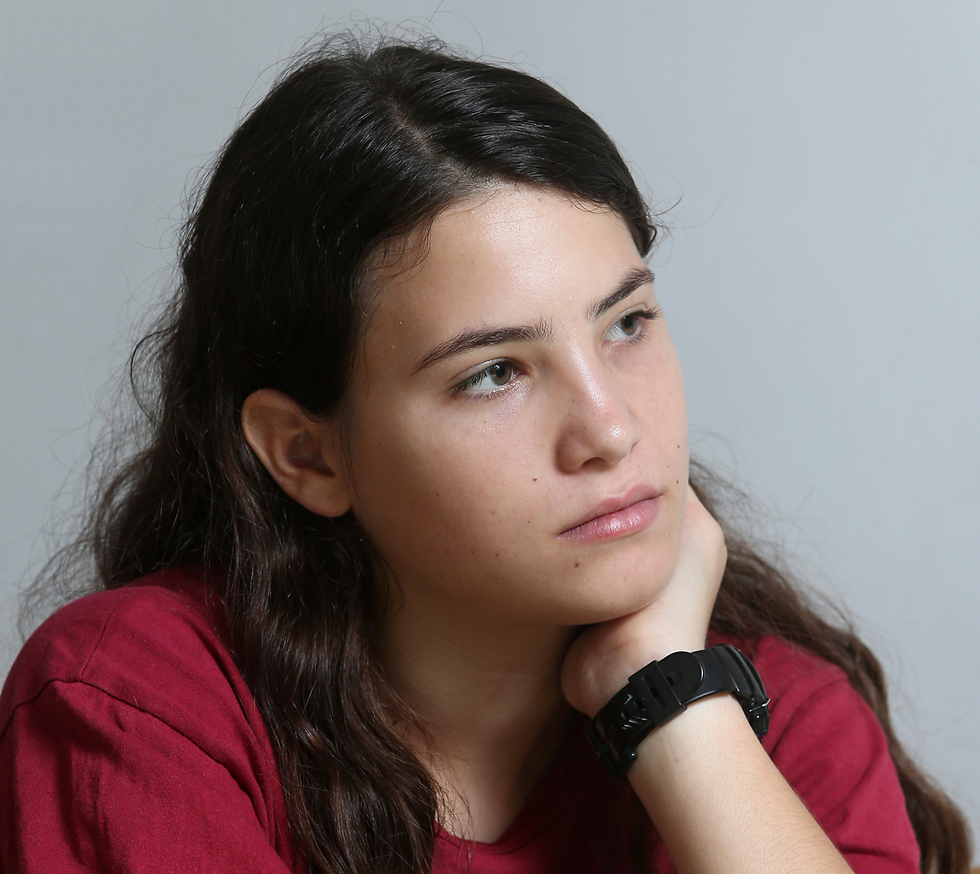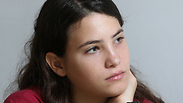
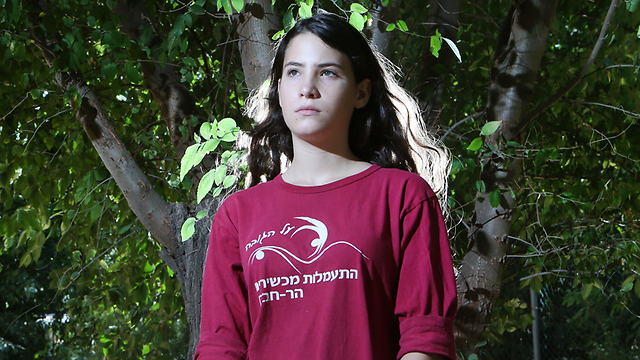
Daughter of terror victim: 'My father died while saving my life'
A month after Rabbi Miki Mark was murdered in a drive-by shooting near Otniel, while his wife was seriously wounded, his daughter, 14-year-old Tehila, is now trying to figure out how to go on. She talks about the moments of horror and shock, the unexpected help from Palestinian passerby and terribly missing her father.
Tehila, the seventh daughter, remembers the easy-going mood at home in the days before the attack. And now, all of a sudden, everyone is so busy, dividing the responsibilities of arranging a funeral and the shiva (Jewish mourning period) between them, sitting by the wounded mother and daughter, looking after the little kids, giving strength to the older ones.
"When my dad was alive and my mom was well, everything was calm and organized," she says, her smile filled with pain. "We barely had to do anything. My mom would start cooking for Shabbat on Thursday, and on Friday afternoon the table would already be set, the food ready on the Shabbat hot plate, everyone already showered, and the house ready—waiting for Shabbat to begin. We were used to this, and it was never stressful or hard. We were a family blessed with children, but mom never had difficulties at all. It never seemed like it was any effort for her. She just went with it. And even if the house was a little bit of a mess, she'd always smile and encourage us to enjoy ourselves, and when we went to bed she'd tidy up after us."
And now?
"Now everyone's running around, cooking and doing laundry and running the house, but no one can take over and bring it to what it was before the attack, when mom—the one and only—did everything by herself."
Tehila misses her father very much, as do her siblings, aunts and uncles, and her grandmother—all sitting in the room with her.
"Last Saturday, when the entire extended family came to the synagogue with the wives and husbands and children and friends, it looked like the exodus from Egypt. Everyone was sitting together. The young ones were playing and the older ones were comforting one another. And there was this unity that my parents raised us to and talked since we were born. I thought then that my father may have been murdered, but he left an entire tribe behind that can continue on his path together," she says.
A disaster strikes at dusk
Tehila found herself at the scene of a terror attack on the first day of summer vacation. It was on Friday, at dusk, and she was on her way with her parents and brother to spend Shabbat at the home of her grandmother Zelda, Miki's mother. It was then that the young girl, only 14 and a half years old, witnessed her father murdered and mother seriously wounded.About 30 days have passed since that horrible day, and Tehila remains quiet and reserved. At her grandmother's home in Jerusalem, sitting in front of the large bookcase her father, an amateur carpenter, built at a young age—Tehila is surrounded by love. Everyone came to hug, remember, and share their pain.
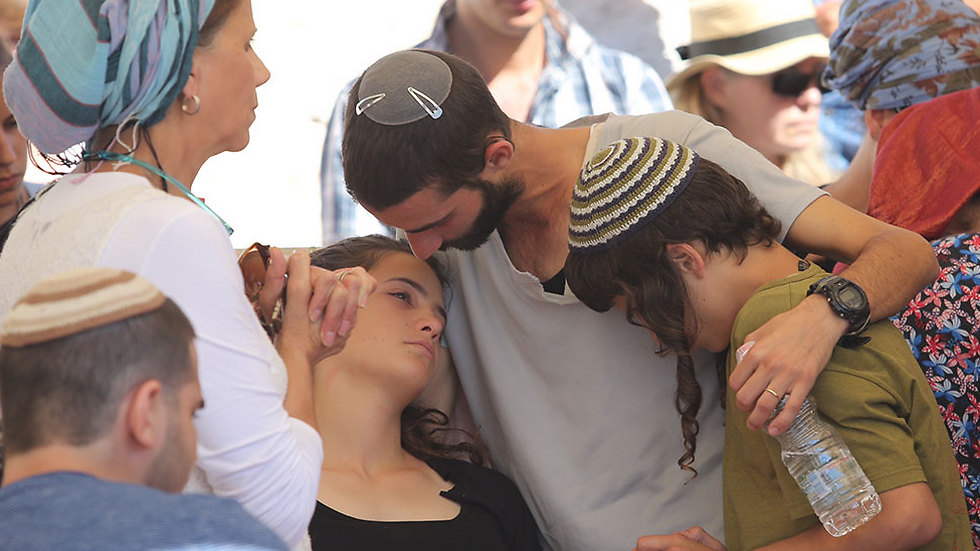
The bullets of the terrorist, which killed her father and wounded her mother, hit her as well. One of them entered her abdomen. The doctors removed it in an operation and saw that no significant damage was caused to her internal organs. After days in the ICU, Tehila was transferred to the Department of Surgery and a week later she was discharged, sent home to continue the healing process. At least physically, she's recovering well. Her soul, however, will need a lot longer to heal.
A month later, she says, and "things are just getting harder. I didn't think it would be easier, but I also didn't think it would be harder. My entire life turned upside down. I need to get used to a completely different reality, a new daily routine. I need to get used to these strange days whereI can't even call my dad or talk to my mom. Because this is summer break, and there's no routine during summer break anyway, it's harder to return things to the way they were before the attack. We need to take care of medical appointments, visiting my mom, my little sisters. We have to find them something to do and help them. They want to go to the beach, get some air, feel the summer. So I take them to the pool, try to make them happy, but my heart is hurting. Today is my sister Rina's birthday, she's turning 10. How can we celebrate without mom and dad? It doesn't make sense."
So you're going to pass up on celebrations this year?
"No. Absolutely not. We'll organize something to make her happy."
And how is your mom doing?
"My mom's life is no longer in danger, but she's still not doing very well. The seatbelts saved all of us when the car flipped over, but the bullets hit her upper body. She has a long rehabilitation process, and there's a long road still ahead. We told her about dad, but we don't really know what she understands and what she knows. Sometimes she tells us, 'your dad is at work, he'll be home soon.' So I talk to her mostly about myself—what I did that day, what's new."
Do you talk to her about the attack?
"No. Because I don't know what to say, what would be too difficult for her or how would she react."
‘Suddenly, the shooting started’
Rabbi Michael Mark, 46, was amongst the first to move to Otniel. He started managing the hesder yeshiva (a program combining military service with Torah studies) at age 24."They told him 'Come, try this for a little,' and since then he's been there," his daughter says with a smile. "He was a teacher through and through, that's why he was so perfect for this job. He would talk to the students for hours and they all knew they could come to him for guidance. Young couples consulted him on both spiritual issues and technical problems. He was very wise and creative and always found an interesting way to look at every issue. Before the attack, three or four couples a week would come to our house for guidance."
Tehila says her father made the most of every moment he had on earth.
"On the day of the attack, we were on our way to visit his mother, my grandmother, to have Shabbat with her so she won't be alone. After all, the Torah says, 'Honor thy father and thy mother, so that thy days are prolonged.' So how is it possible that my father was murdered at a young age, when he was on his way to fulfilling the commandment of honoring his mother? I thought about this a lot, but then I realized that 'prolonged days' doesn't necessarily mean living to the age of 200. It could also mean that your days, each day separately, would be long. My father's days were very long. He managed to squeeze so much into them. He'd get up at 4:30am and go to sleep late, and every hour of the day focused on and used for important things. His cousin Yossi (Cohen), the director of the Mossad, said in his eulogy that when my mother was 17, my father came and told him 'I'm going to propose to her.' So Yossi asked him, 'What's the rush?' And dad said, 'It's a shame to miss any day that you can make into something.' Dad knew how to prioritize his time, and on that list of priorities—we were first."
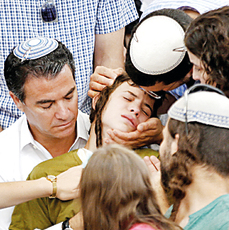
The attack happened July 1 on Highway 60—near the Jewish settlement of Beit Hagai and Palestinian town of Dura. "I remember we said the Traveler's Prayer in the car, and then I put in my earphones. We barely left the house and all of a sudden there were shots."
A car with Palestinian terrorists sped past the family's car and opened fire on it. "I heard a boom, and immediately after that a burst of gunfire," Tehila recounts. "Mom yelled 'Shooting!' and everyone else yelled 'Get down!' so Pedayah and I ducked, but dad kept on driving. A few seconds later, the car flipped over and then it was quiet for a few minutes. And then I yelled. I tried to talk to my parents. We were trapped in the car and looking for a phone, but we couldn't reach it. All of a sudden we heard kicking and we saw an Arab man trying to open the doors and get to us."
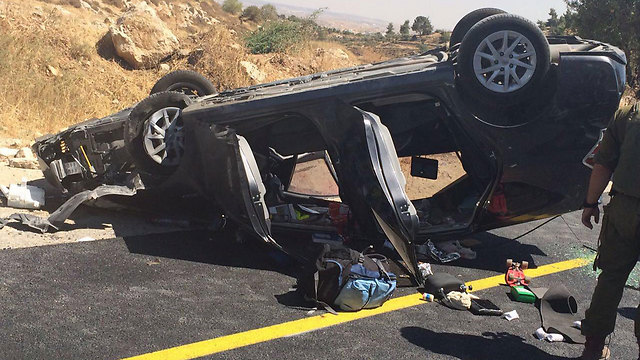
Where you afraid he might be the terrorist?
"No, because despite the fact he was talking Arabic, he was really trying to calm us down and made a great effort to open the doors. Eventually he managed to open them and helped us out. With hand gestures he tried to tell us not to be afraid and took us to his car. Later, people asked me 'Weren't you afraid he would kidnap you?' But I wasn't really in a state to be afraid, I was in shock. The Arab man's wife was in the car, a nurse by profession, and kept trying to calm me down and was very friendly. Meanwhile, a crowd of Arabs was gathering around the car. I told the wife I had a bullet in my stomach, and she told me to put pressure on the wound to stop the bleeding."
Did you realize this was a terror attack?
"I realized what was going on from the first shot. I wasn't confused. I was also sure mom and dad had been murdered. It was only when I was in the Palestinians' car that I asked what about my mom and dad, and the wife told me 'Your mom is fine.' And then I realized dad wasn't."
Did you feel any pain?
"The gunshot to the gut didn't hurt at all. I saw Pedayah wasn't wounded, that he was okay. He kept telling me 'Hold on, hold on,' and I told him 'I'm fine, just call someone,' because no one had shown up. An Arab doctor that was passing by stopped his car and came to help us. He later said he was on his way to prayers. He gave me a towel to put pressure on the wound and gave Pedayah his phone to call for help. Five minutes later, the soldiers came."
Rabbi Michael Mark was trapped in the car. He was unconscious, not breathing and had no pulse when he was extracted from the vehicle. Magen David Adom paramedics, with the help of the IDF's Medical Corps, tried to resuscitate him, but to no avail. His wife, Chava, was seriously wounded from the gunfire and taken to the Hadassah Medical Center in Jerusalem's Ein Karem.
"They gotmy mom and dad out of the car. Pedayah saw mom trying to touch the bandages on her head, and that's how he knew she was alive—but I didn't see it, and I only saw my dad from the side. Four ambulances came. The first took my mom because she was the one most seriously hurt, the second took me, the third took Pedayah and my dad was taken last, separately."
Some of Tehila's relatives were already waiting for her at the hospital when she arrived. "There were a lot of doctors around," she says. "The wound started hurting at that point, but only moderately. Imaging showed that it was likely that I had damage in my intestines and that I needed surgery. My sister-in-law accompanied me to the OR, and several hours later I woke up in the ICU."
The next day, on Saturday morning, Tehila was sufficiently recovered to receive the terrible news about her father's death from her siblings. "But I already knew that dad had been murdered," she says in tears. "When my siblings told me, it was only a confirmation."
About the fact it were Palestinians who helped her out of the car and took care of her until help arrived, Tehila says, "One hand is cruel, while another is kind. My father believed in the good in people and always said the majority (of Palestinians) wanted to live in peace. I know that not all of the Arabs are good, and that some are terrorists and murderers, but we need to reach out to those who want peace and contend with those who want war. There were people who tried to yell 'Death to Arabs' at the funeral, but we asked them not to do that and to respect the family and dad's memory, because extremism was not his way."
Like a nightmare
That Shabbat, the day after the attack, was a long and terrible one. "On Saturday night, before dad's funeral, all of the children were given a pencil and paper and asked to write a eulogy," Tehila says. "At first I didn't want to. I felt it was too hard and I didn't even know if I could make it to the funeral. But in the morning I told the doctors that I had to accompany my dad on his final journey, and they gave their permission for me to be taken in an ambulance on a gurney. When we got to the cemetery, I suddenly felt compelled to write. I got out the pencil and paper and wrotemy dad a eulogy."
But when it was her turn to speak, Tehila was too weak to read it herself, and her aunt read it for her. "It was a bad dream," Tehila says. "Truly a nightmare."
She spent most of the seven days of mourning at the hospital, but was discharged home shortly before they ended. "It was very strange to come from the quiet hospital to my home and find out it wasn't really my home. People had taken it over. I came in and I couldn't see the living room and the kitchen because there were so many people. So I stayed in my room with my friends. At times, I came out of the room and spent some time with my siblings and my grandmother, but mostly I just needed some peace and quiet.
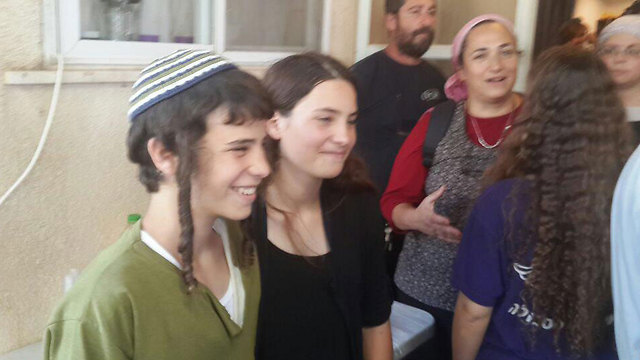
"During the (seven days of mourning) at home, I missed my mom the most, and at the hospital I missed my dad the most. I was thinking that if he had survived, he would have stayed strong for all of us and would have moved heaven and earth to make my mom well. And if my mom had been with us for the shiva, it would have given us a lot of strength. It was only on the last day that I thought that if my mom had been with us for the shiva, it might have been even harder because she was so close to our dad and it's impossible to imagine her without him."
"I don't even know what's going to happen next, and how can we even move on," she says in pain. "I think about Shabbat, our biggest family day. My mom studying (Torah) with my dad, my dad blessing us, and both of them dropping all of their other things because Friday to Saturday night is a time dedicated entirely to family. They don't deal with anything other than the children. They study with us, talk to us, we laugh and read together. I don't know what Shabbat will look like in the future. I know what our Shabbat looks like now—it's a sad day. It's hard for me to think of the future. My dad won't be at my wedding, he won't walk me down the aisle. It's incomprehensible, it doesn't make sense."
What gives you comfort?
"Knowing my father was murdered for the sanctification of God's name. Only truly righteous men get to die for the sanctification of God's name. And also realizing that my father was murdered because he saved me. I'm feeling very grateful. I was privileged to have such a father, even if it was only for a short time."
'We're like a phoenix'
But life goes on, and the Mark family is trying to adjust to a new routine. The children visit their mother in the hospital in turns—not leaving her side for even a moment—while at the same time preparing for what comes next.
The older children help, as do the aunts and uncles and the rest of the extended family. With their help, Tehila is trying to adjust to life as it is now. "It's really hard for me to travel on the road the attack happened on," she says. "At first, when we went through there, everything came back to me, so I asked that we bypass it. But I've since gotten over that and we take the regular route."
When you grow up, do you want to keep living in Otniel?
"I don't know if I'd want to live here," she says frankly. "I hope I'd want to, that I wouldn't be afraid. Dafna Meir, who was murdered by a terrorist at her door, lived three doors down from us. But when it happened to her, it didn't feel like it had anything to do with me. I was very sad because I knew her, but I didn't feel unsafe in my own home. We in Otniel are very familiar with grief. Twelve people from the settlement were murdered and yet, until this attack, I never felt afraid to live here. Of course I'd like the State of Israel to do more so we can feel safer. Otniel is our home, and it hasn't stopped being so, even when terrorists came here."
So you're not afraid?
"I might be afraid, a little bit, but dad always said that every bullet has a target and that those that need to die, would—be it in a car accident, at the dinner table at home, or on the way to visiting their mother on Friday night. We believe that if you want to achieve something, you have to fight for it, and that good things don't come easy. We have a strong nation that went through riots and pogroms, the Holocaust, wars and terror attacks—and yet we keep going and believing things will be better. There are difficult challenges ahead, but we'll deal with them. It's hard and it hurts, but we're trying not to break. We fall and we get back up, like a phoenix."















